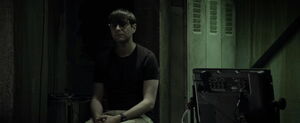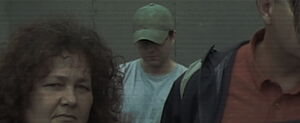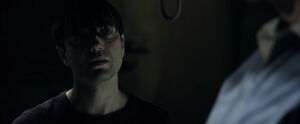| This article's content is marked as Mature The page contains mature content that may include coarse language, sexual references, and/or graphic violent images which may be disturbing to some. Mature pages are recommended for those who are 18 years of age and older. If you are 18 years or older or are comfortable with graphic material, you are free to view this page. Otherwise, you should close this page and view another page. |
| “ | We've got a problem in our society. Nothing that we say has any value anymore... No credibility... I say I'm going to pay my bills, it doesn't matter. The lender needs a credit check to prove that I have, to prove that I will... Nobody believes anything we say anymore without proof of intention, so if I say that I am going to kill a man, then I need to prove I have killed a man... Proof of intention. | „ |
| ~ Henry explaining why he kidnapped Ron. |
Henry David Cole is the main antagonist of the 2019 crime thriller film American Hangman. He kidnapped a 14-year-old girl named Claudine, because he saw her as pure and wanted to protect her from losing her innocence, but he felt guilty about it afterwards and hoped that the police would find him and arrest him. However, due to the incompetence of the police, a local introvert was arrested and executed for the crime. When his guilt is too much to bear, Henry kidnaps the judge who tried the Jeeter case and films a trial for the whole world to see, in which he allows the audience to vote on the verdict. In the end, both Henry and Judge Straight are found guilty and sentenced to death.
He is portrayed by Vincent Kartheiser, who also played Connor in Angel and Scarecrow in Titans.
Biography[]
Murder of Claudine Jeeter[]
Henry lived in a house located at 43 Glenmount Crescent, across the street from the Jeeter household. He knew the Jeeter's fourteen year old daughter, Claudine, and saw her as innocent and pure. So, on February 10th, 2012 he kidnapped her while she was walking home from school and kept her hidden in an underground bunker. The police investigated for two years and didn't find her abductor, despite having interviewed him twice. With all the public pressure, the police found very little evidence and chose a scapegoat in a lonely man named Paul William Gager. A trial was held and Gager was found guilty and sentenced to death.
Trial of Judge Straight[]
Six years later, the night after Gager's execution, Henry kidnaps the judge of the Jeeter case and a random man and chains them up in the basement of the local police station. He then begins live streaming, through various cameras and asks the two to introduce themselves to the viewers. After they comply, Henry hands them newspapers and tells them to read various articles. Then he cuts off the random man's middle finger with pruning shears to show he's not bluffing, sets a timer telling them they have five minutes to figure out what the connection is between them, and leaves the room.
When the timer is up and Henry comes back, Judge Straight deduces that there is no connection and that Henry kidnapped Ron simply because he spotted him from where he was picked up. Henry admits to this and reveals that his true intentions for Ron was to kill him and prove to the viewers and Judge Straight that the stream is real. He then covers Ron's head with a jacket and shoots him in the head with a revolver. After dragging Ron's body out of the room, Henry reveals his reason for kidnapping Judge Straight: Henry plans to hold a trial for him with the viewers as the judges.
As the trial goes on, Henry eventually reveals himself as Claudine's abductor and killer. A news reporter examines footage from a news report some time after the kidnapping, and finds a suspicious man hiding his face and using a legal term. They send this to the police, who find the address of a man named Henry David Cole. With the address, the police send a team to investigate the house, where they eventually find Henry's bunker. As the verdict nears, the police lieutenant notices a cabinet in the stream similar to one in the police department and realizes that the trial is being held in the closed-off basement of the police department. The viewers decide that Judge Straight is to be found guilty, just as the team heads to the basement. Henry unlocks the door and finishes the sentencing, but hands Judge Straight the gun. The police team arrives and shoots Henry, but also indirectly shoot Judge Straight. Despite the shootings being recorded, the team maintains they had no choice.
Quotes[]
| “ | I'm sorry... | „ |
| ~ Henry apologizing to Ron before shooting him. |
| “ | Do I have your attention now? | „ |
| ~ Henry talking to the audience after killing Ron. |
| “ | From the moment Claudine Jeeter was taken, she was front page news. A fourteen year old girl, straight A student, with a little pet terrier named Brownie--plucked out of her world on her way home from school. Everyone was gripped. The public, the police, the Judge to be. Everyone. We all saw the Grandmother Mrs. Solsza on our TV's practically every night, as well as the cousin, the family spokesman, Bertinad Solsza. They became fixtures in our living room, part of our news, reality. As a result, the prosecution will argue that the verdict in the Jeeter case was manufactured instead of arrived at in the courtroom. Not out of malice, but out of genuinely honest outrage and desire. A desire to see someone pay for the killing of young Claudine. But the prosecution will prove that as a result of this desire, there was a race to the gallows. A race run on the fuel of police incompetence and judicial corner-cutting, civil servants recreant to their duty, so an innocent man was put to death. Whether the state thought Paul William Gager was guilty or not is not the point. Does it matter if I thought Ron the roofer was guilty of some crime only later to discover that he wasn't? Of course not. All that matters is I killed him and I had no right to kill him. The state killed Paul William Gager and they had no right to kill him. The prosecution will prove this beyond the shadow of a doubt by pointing out that his arrest and trial was systematic of a justice system that is ignorant, corrupt, and bloodthirsty. | „ |
| ~ Henry's opening statement for the trial. |
| “ | He may have been close to her. Close enough that he saw her. Not every day but enough. Enough to know how she went about her life. Walking to and from school with her friends, and playing with her dog in the park, and when she was forced to take her brother to the corner store and she hated it, you could tell. Her arms and legs in the summer. The shade of her skin. She was a pure thing. Slowly he realized he wanted to possess that purity. Hold it. Hold it in his hand like a snowflake. Protect it from being sullied. And then eventually he realized that he would take her. He would take her and he knew it was an awful thing. A horrible thing to do. He wrestled with it. Can you imagine? Wrestling with a thing like that? And then he just took her. In that one simple act. Seconds really. His whole life up until then just shattered. Like a... like a mirror into a million pieces. But then he saw the reaction of the news, and the press, and the police, and he was so relieved because he realized he would be caught. They would catch him. I mean, they had to. He always saw them on television. They were always saying that they were getting the job done. Working day and night. They wouldn't rest until they found the killer. But day after day went by, day after day he wasn't caught, he wasn't captured. And he came to realize that he was not going to be caught, and the reason for that was this: They didn't know what they were doing. Sure they looked like police, but they weren't. Not really. Day after day, they waved him through their preliminary police check points, and day after day he could breathe less and less and less. Now it might have been that the abductor began to test things. The first time that they questioned him he gave them two clues. Now, they weren't easy, but they weren't hard. Nothing came of it. So the next time he made it easier. Obvious even. Didn't matter, they didn't follow up on that either. So finally he mailed in an anonymous confession. He even included some of his own DNA. But the police lost it. Now if you can believe this: They were actually in the yard where she was being kept. They were right there. All they had to do was walk the three extra feet but... gosh they just couldn't bring themselves to do it. They would have found her if they had. And once he realized how lousy it all was, that the conclusion was inevitable. He would have to kill her. He would have to kill the girl. That would be the only way that they could catch him. Once they had the body, once they had the evidence then they would need to catch him. And once they caught him they would put him to death because that's the only thing that should happen to somebody like him. Someone like him that would do a thing like that to somebody like her deserves to die. So he killed her, and once he began to reckon with the real moral realities of the situation, he tipped off the police. The police came and they collected the body, and they collected the evidence, and after that they got everything wrong. They accused Paul William Gager. Paul William Gager, just because she was on his property. And because of the rabbit hutches made out of construction signs. And of course that God damn photo. And that's what the cable news ran with. That-that photo for four days straight. Every headline. And by the time they were finished with him, the whole country knew that he did it. The trial, that was only a formality. All that was left was for you to preside over the execution. Yes. I am the prosecution's final and most irrefutable proof that you killed an innocent man. | „ |
| ~ Henry's confession. |
| “ | We're both done. Says so on cable news, so it must be true. | „ |
| ~ Both Henry and Straight are found guilty. |
| “ | Oliver Straight, you have been found guilty by a jury of your peers for taking the life of an innocent man. As such it is the decision of this court that your own life shall be taken for his. | „ |
| ~ Henry sentencing Judge Straight. |
| “ | Repeat after me. Life shall go for life. (Straight: Life shall go for life.) Eye for eye. (Straight: Eye for eye.) Tooth for tooth. (Straight: Tooth for tooth.) Hand for hand. (Straight: Hand for hand.) Foot for foot. (Straight: Foot for foot.) | „ |
| ~ Henry getting ready to execute Straight. |
Gallery[]
Trivia[]
- Henry was unarmed when the police shot him, as he gave the gun to Judge Straight. This could mean the officers that shot him could be charged with unlawful use of a firearm, or even murder.














